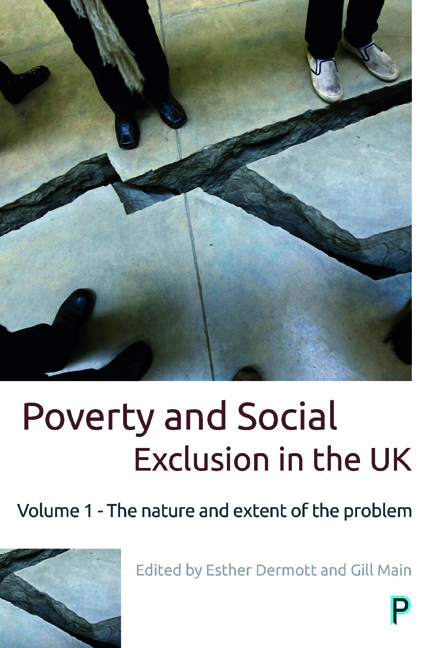Book contents
- Frontmatter
- Dedication
- Contents
- List of tables and figures
- Notes on contributors
- Acknowledgements
- Introduction: poverty and social exclusion in the UK
- One Measuring poverty in the UK
- Two The impoverishment of youth: poverty, deprivation and social exclusion among young adults in the Uk
- Three Improvement for some: poverty and social exclusion among older people and pensioners
- Four Which men and women are poor? Gender, poverty and social exclusion
- Five Better understandings of ethnic variations: ethnicity, poverty and social exclusion
- Six Improving lives? Child poverty and social exclusion
- Seven The cost of children: parents, poverty, and social support
- Eight A worsening picture: poverty and social exclusion and disabled people
- Nine Devolution and North/South division: poverty and social exclusion in the countries and regions of the UK
- Ten More similarities than differences: poverty and social exclusion in rural and urban locations
- Conclusion: innovating methods, informing policy and challenging stigma
- Technical appendix
- Index
Nine - Devolution and North/South division: poverty and social exclusion in the countries and regions of the UK
Published online by Cambridge University Press: 08 April 2022
- Frontmatter
- Dedication
- Contents
- List of tables and figures
- Notes on contributors
- Acknowledgements
- Introduction: poverty and social exclusion in the UK
- One Measuring poverty in the UK
- Two The impoverishment of youth: poverty, deprivation and social exclusion among young adults in the Uk
- Three Improvement for some: poverty and social exclusion among older people and pensioners
- Four Which men and women are poor? Gender, poverty and social exclusion
- Five Better understandings of ethnic variations: ethnicity, poverty and social exclusion
- Six Improving lives? Child poverty and social exclusion
- Seven The cost of children: parents, poverty, and social support
- Eight A worsening picture: poverty and social exclusion and disabled people
- Nine Devolution and North/South division: poverty and social exclusion in the countries and regions of the UK
- Ten More similarities than differences: poverty and social exclusion in rural and urban locations
- Conclusion: innovating methods, informing policy and challenging stigma
- Technical appendix
- Index
Summary
Introduction
The focus of this chapter is on the spatial analysis of poverty and social exclusion in the UK, drawing on the Poverty and Social Exclusion Survey 2012 (PSE-UK 2012) and other data. The growing interest in the geography of poverty reflects the longstanding concern with regional economic and labour market imbalances as well as the politics of devolution in its various guises. The chapter critically appraises the contemporary policy frameworks for tackling spatial variations in poverty. The traditional debate between area-based interventions and anti-poverty strategies targeted on selected individuals and groups is revisited in the context of both the new ‘war against the poor’ and the prospects of devolution, including the ‘revolution in the way we govern England’ (Osborne, 2015), whether through the ‘Northern Powerhouse’, city regions or elected mayors. The implications of the UK leaving the European Union (EU) – ‘Brexit’ – are touched on where relevant.
Geographies of poverty
While there is a strong tradition of studying the spatial distribution of poverty in the UK, this has been hampered by a lack of consistent measures and policy goals, making assessments over time difficult (Dorling et al, 2007, p 2). There are two main traditions, the first based on measures of deprivation derived largely from administrative sources (Beatty and Fothergill, 2014) but also from the Census (see Tunstall and Lupton, 2003), and the second based on sample surveys of income. The PSE-UK 2012 survey falls into the latter tradition, but its strength lies in combining income data with deprivation and a wide range of measures of social exclusion.
Multiple deprivation indices are principally used for targeting resources towards areas of greatest need (Smith et al, 2015, pp 69– 73), whether this involves the distribution of financial support or the rationing of services as English local authorities struggle to manage a 23.4% per capita cut in overall funding between 2009/10 and 2014/15, with more to come (Innes and Tetlow, 2015). These cuts have been, and will be, applied very unevenly: ‘on the whole, more deprived areas and those that saw faster population growth have seen larger cuts. Further cuts planned for 2015–16 will generally be focused on the same local authorities that have lost over the last five years’ (Institute for Fiscal Studies, 2015).
- Type
- Chapter
- Information
- Poverty and Social Exclusion in the UK Vol 1The Nature and Extent of the Problem, pp. 193 - 218Publisher: Bristol University PressPrint publication year: 2017



